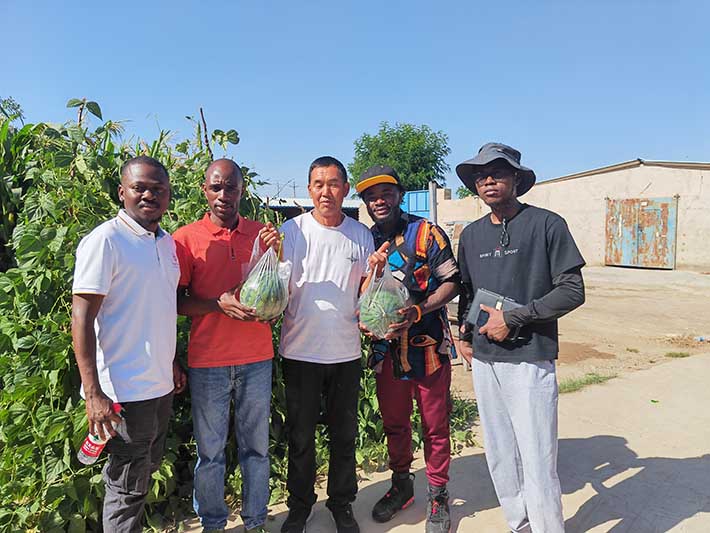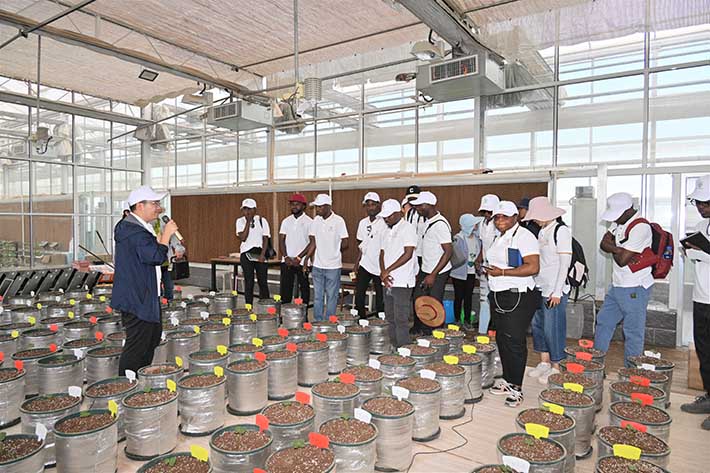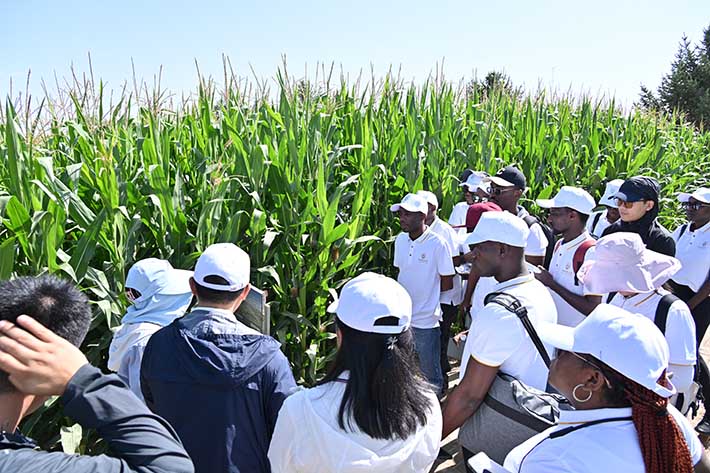|
||||||||||
| Home Nation World Business Opinion Lifestyle ChinAfrica Multimedia Columnists Documents Special Reports |
|
||||||||||
| Home Nation World Business Opinion Lifestyle ChinAfrica Multimedia Columnists Documents Special Reports |
| ChinAfrica |
| From Desert to Oasis |
| What Burundi can learn from a successful case of rural transformation in China’s Gansu Province |
| By Assa Nsabiye | VOL. 16 February 2024 ·2024-02-29 |

Assa Nsabiye (second right) and his classmates pose for a group photo with a local farmer (centre) in Wuwei, Gansu Province, on 22 July 2023
Wuwei City in Gansu Province in northwest China was once an impoverished area characterised by arid and barren land. After years of reform and restructuring, Wuwei saw its last impoverished residents lifted out of absolute poverty in 2020, and has undergone a stunning transformation, becoming an inspiring case study of sustainable agricultural development.
Wuwei’s adoption of precision farming, smart irrigation systems and drone-based monitoring has not only boosted productivity but also minimised water usage and reduced the environmental impact. The government’s subsidies, land reform policies and capacity-building initiatives have played a crucial role in empowering farmers and fostering collaboration with the private sector, resulting in sustainable agricultural development.
During a field trip for my research work, I had the chance to witness the remarkable success of Wuwei in transforming its arid desert landscape into a thriving agricultural oasis through innovative technologies and government support.

Members of a study group visit an agricultural research facility in Wuwei, Gansu Province, on 22 July 2023
Innovation and knowledge transfer
At the forefront of this transformative journey is the Shiyanghe Experimental Station for Improving Water Use Efficiency in Agriculture, located in Liangzhou District of Wuwei. It has conducted extensive research and development to devise methods to overcome the challenges posed by the unforgiving arid climate and limited water resources in the area.
One such solution that has played a central role is drone-based monitoring. These futuristic flying machines capture high-resolution images and collect valuable data about the farmland, such as crop health, soil moisture levels and pest infestations. Through these aerial observations, farmers gain insights into the conditions of their crops, allowing them to make informed decisions about irrigation, fertiliser and pest control.
Precision agriculture is another superhero in Wuwei’s tale of sustainable agricultural development. By harnessing advanced technologies like GPS and satellite imagery, farmers have gained the ability to precisely manage the allocation of resources in their fields. They can thus judiciously distribute water, fertiliser and other inputs, ensuring that each plant receives exactly what it needs.
Thanks to these and other measures, crop yields have skyrocketed, leading to higher incomes, which, combined with lower input costs, have put the farmers in a better position to raise the quality of their life.
During my field trip, researchers at the experimental station said that knowledge transfer to farmers has been beneficial for local development. They stressed that the experiments at the centre and the subsequent knowledge transfer to local farmers has yielded positive outcomes.
The first notable change they mentioned was increased crop yields. By testing different methods within the experimental station, the researchers have been able to identify those that are most effective in maximising production. This increased productivity not only ensures food security for the local population but also has the potential to increase their income through surplus produce sales.
Another positive outcome is improved resource management. Through the experiments, the station has identified methods that require less water and fertiliser while achieving the desired crop outcomes. By transferring this knowledge to the farmers, they have helped to optimise resource utilisation. This has not only reduced their production costs but also minimised the negative environmental impact associated with excessive use of water and fertilizer.
The knowledge transfer process itself has had a positive impact on the community. There are farmer schools that serve as platforms for sharing expertise, experiences and best practices among farmers. This exchange of knowledge fosters a sense of teamwork and cooperation among the farmers, leading to a supportive and united farming community. These platforms also encourage innovation and experimentation, as farmers share their own insights and strategies, ultimately boosting agricultural development in the region.
With the adoption of efficient farming methods, farmers have been able to save time and energy, which they can devote to other activities to diversify their income sources.
Beyond the economic and environmental gains, the introduction of efficient farming practices has also contributed to the overall sustainable development of the Shiyang River Basin. The increased agricultural productivity has reduced the need for expanding cultivation areas, thereby curbing deforestation and habitat loss.
The efforts made by the station have had a profoundly positive impact on the lives of the local population. By rejuvenating the land and creating sustainable income-generating opportunities, the station has contributed significantly to poverty reduction and improved the livelihoods of countless individuals.

Members of a study group visit a maize field in Wuwei, Gansu Province, on 22 July 2023
Role of the villagers
During the field trip, I had an in-depth conversation with one of the local leaders in Wangjingzhai Village of Wuwei, which greatly broadened my understanding of the local development process.
He said that while the government has played a crucial role by providing subsidies and other forms of assistance, it is ultimately the efforts of the villagers themselves that have led to the village’s development, and they are determined to make further progress.
The villagers’ dedication to their own development can be seen in various aspects. They have actively participated in training programmes and workshops to enhance their knowledge and skills, enabling them to engage in more profitable and sustainable economic activities. The local leader also mentioned that the villagers have embraced modern agricultural practices to improve productivity and efficiency in their farming activities. Additionally, the villagers cooperate closely with one another, sharing resources and knowledge, and collectively making decisions for the betterment of the whole community.
Zhang Zeyu is one such villager I had the opportunity to speak with. In his five greenhouse structures, he cultivates a variety of crops including tomatoes, watermelons, cucumbers, peppers and lettuce. These greenhouses not only provide him with a controlled environment for his crops but also enable him to extend the farming season and improve the quality of his produce.
Apart from the greenhouses, Zhang has a vast farm spanning 2,000 mu (approximately 133 hectares). Here, he cultivates maize and wheat, further diversifying his agricultural activities.
The government grants and subsidies have played a crucial role in Zhang’s farming success. With the financial assistance received, he has been able to expand his farming operations, increase his yield and improve the overall quality of his crops. In addition to the monetary benefits, Zhang also mentioned that he has received training and guidance from agricultural experts on sustainable farming practices and pest management. This has allowed him to minimise the use of harmful chemicals and adopt eco-friendly farming methods.
His story serves as an inspiration to other farmers, demonstrating the importance of financial aid and knowledge sharing in agricultural development.
The journey of Wuwei towards sustainable agricultural development is nothing short of inspiring. It serves as a beacon of hope for other arid regions around the world like Burundi, demonstrating that with the right mix of innovation, research and determination, even the harshest landscapes can bloom and thrive.
The author is PhD Student of College of Engineering at China Agricultural University, Beijing
|
||||||
| About Us | Contact Us | Advertise with Us | Subscribe |
| Copyright Beijing Review All rights reserved 京ICP备08005356号-5 京公网安备110102005860号 |